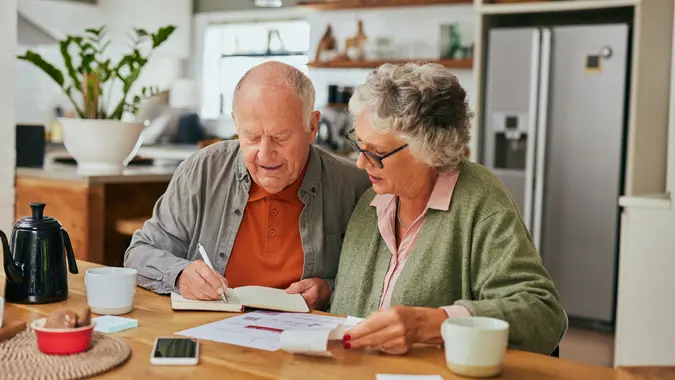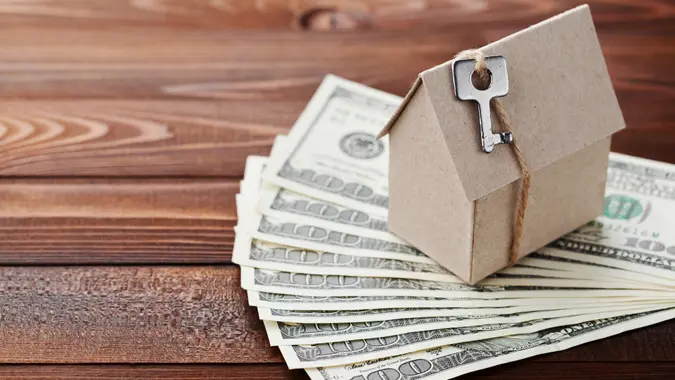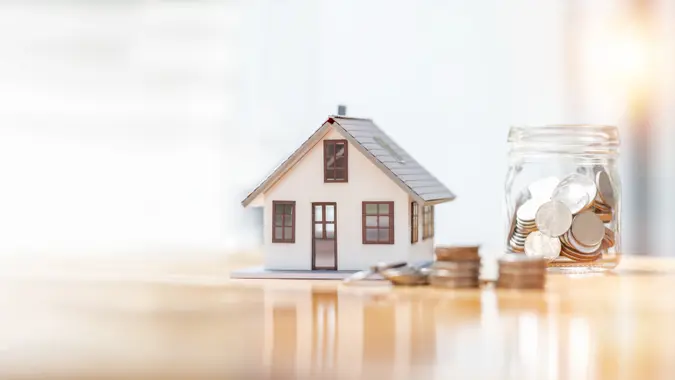3 Reasons To Pay off Your House Early — and 3 Reasons Not To

Commitment to Our Readers
GOBankingRates' editorial team is committed to bringing you unbiased reviews and information. We use data-driven methodologies to evaluate financial products and services - our reviews and ratings are not influenced by advertisers. You can read more about our editorial guidelines and our products and services review methodology.

20 Years
Helping You Live Richer

Reviewed
by Experts

Trusted by
Millions of Readers
“To pay off your house or not to pay off your house? That is the question.”
GOBankingRates reader Karen brought a touch of Shakespeare to her question for our Top 100 Money Experts series. While it’s not something the brooding prince of Denmark had to fret over, the question of whether to pay off your home early or put your money to other uses — like investing — is one that many homeowners face.
To answer that question, we brought in Alonso Rodriguez Segarra, CEO of Advise Financial. Every day, Segarra helps people like Karen make important decisions that can impact their financial futures. He said there’s no one-size-fits-all answer: There are several reasons why paying off your house early could be the right choice — and several reasons why it might not be.
Segarra walked Karen through the pros and cons and offered additional considerations for our readers.
An Overview
Because Segarra wasn’t aware of the details of Karen’s financial situation, he offered a broader overview of how readers might approach the decision. Most financial planners advise clients to aim to retire debt-free — meaning paying off their mortgage and owning their home outright.
However, Segarra notes that opportunity cost — analyzing where your money will produce the best returns — can sometimes outweigh conventional wisdom.
“In many cases, for families with mortgages at interest rates we know will be difficult to repeat — such as those with rates close to 3% — it is very likely that you can find a rate in a money market fund or some CDs that is above this value,” he said. “If you’re not going to need that money in the short term, perhaps investing that money in the stock market with a widely diversified, low-cost portfolio adapted to your profile could be a good option to seek a higher rate of return.”
Segarra also points out that if you’re downsizing to a house with a mortgage interest rate above 6%, it makes sense to use more of your own money — along with proceeds from selling your old house — to reduce how much you need to borrow.
“As we see, it’s all about the opportunity cost,” he said.
Three Reasons To Pay Off Your House Early
1. Your Mortgage Rate Is Higher Than What You’d Earn From a Safe Investment
Segarra explains that if Karen’s mortgage rate is much higher than what she’d earn from a safe investment like a money market fund or high-yield savings account, paying down her mortgage first makes financial sense.
For example, if Karen’s mortgage rate is 7% but her savings earn only 3.5%, every dollar she uses to pay off her loan effectively saves about twice as much.
“Seen straightforwardly, for every dollar you dedicate to paying off your mortgage, you’re practically getting double the value. On the other hand, the rate of return you’re earning on your high-yield savings account is pre-tax,” Segarra said. “Suppose your tax bracket is 22%. In that case, this means that your effective rate of return is reduced by 22%, so your actual return is 2.73% (3.5 * 0.78), making it even more sensible for your dollars to work more efficiently for you.”
2. The Timing Makes Sense
Let’s say Karen is in year 20 of a 30-year mortgage. By now, she’s likely paid most of the interest, so more of her payments go toward the principal. Segarra says it could make sense for her to focus on paying off her mortgage faster. Once finished, she’ll have more money to put toward other goals, like investing more or boosting her retirement savings.
“Accelerating your payments allows each of your dollars to pay off a larger portion of your debt balance, not just interest,” he said. “This will allow you to more quickly free up monthly cash flow by eliminating debt, enabling you to dedicate yourself more intensely to saving for a goal you want to achieve — such as a financially independent retirement.”
3. Tax Benefits and Peace of Mind
Segarra also emphasizes the peace of mind that can come from owning your home outright. As retirement approaches, keeping a mortgage may require withdrawals from tax-deferred accounts, which are taxed as income.
“Perhaps you’re approaching retirement and don’t want to withdraw money from your 401(k) or traditional IRA when you’re already retired and not receiving a paycheck, knowing that each withdrawal will be considered income,” he said. “You’ll have to pay taxes on it, which means that perhaps a larger portion of the Social Security check you receive will be taxed.”
Three Reasons Not To Pay Off Your House Early
1. You Can Use Mortgage Interest for Tax Benefits
If Karen has a high income, she may choose not to pay off her mortgage quickly because the interest she pays can be deducted on her tax return — thereby lowering her effective tax rate.
To illustrate his point, Segarra gives the example of someone in the 37% tax bracket with a 7% mortgage. They can reduce their effective mortgage rate to about 4.4% after accounting for tax deductions.
“With the changes in the One Big Beautiful Bill Act, they can also reduce, if applicable, up to an additional $40,000 for state and local taxes (SALT),” he said. “This is why we sometimes read that some millionaires and even billionaires, who don’t need a mortgage to buy a home, prefer to take one out to continue maximizing their money.”
2. Your Mortgage Rate Is Lower Than Your Investment Returns
Segarra adds that if Karen’s mortgage interest rate is much lower than what she could earn in a low-risk account, holding onto the mortgage may make more sense.
“Although it may seem almost impossible to many, given today’s high interest rates, many people have managed to obtain a rate below 3%,” he said. “Therefore, if they invested that money in a portfolio that hypothetically yielded 7%, they would have the opportunity to grow that money substantially.”
3. You Want Flexibility and Access to Cash
Karen may prefer to keep her money easily accessible. In that case, she’d be better off putting her money into a money market fund, where it will earn interest but can be withdrawn at any time.
If she’d rather have a financial safety cushion — or money she could use to take advantage of a market dip, which typically happens every few years — it may make more sense not to tie all her money up in her home.
“During these times, cash is king, and investors wait for a good opportunity,” he said. “If they used this money to pay the mortgage, they would completely lose this flexibility.”
Bottom Line
Whether Karen decides to pay off her mortgage early or not depends entirely on her unique situation. Segarra encourages her to remember the “personal” in personal finance.
“Personal finance is more personal than just finances. It’s essential to evaluate how deciding whether to pay your mortgage will make you feel,” he said.
This article is part of GOBankingRates’ Top 100 Money Experts series, where we spotlight expert answers to the biggest financial questions Americans are asking. Have a question of your own? Share it on our hub — and you’ll be entered for a chance to win $500.
This article is for informational purposes only and does not constitute financial advice. Investing involves risk, including the possible loss of principal. Always consider your individual circumstances and consult with a qualified financial advisor before making investment decisions.
 Written by
Written by  Edited by
Edited by  Money Expert
Money Expert 

























